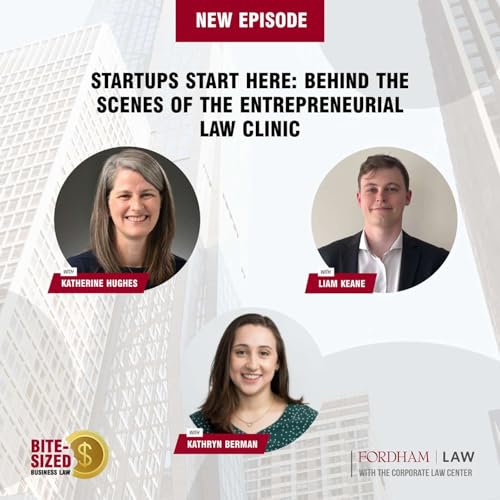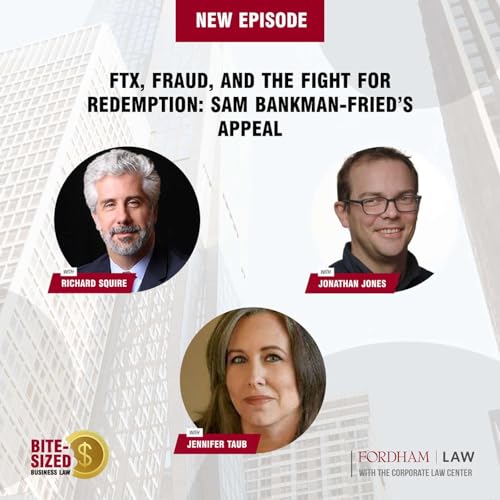The rise and fall of FTX remains one of the most shocking financial scandals in modern history, and the story is far from over. In this special live episode of Bite-Sized Business Law, host Amy Martella moderates a discussion on FTX, fraud, and the fight for redemption, examining what Sam Bankman-Fried’s ongoing appeal could mean for his legacy and for crypto itself. Joining the panel are Richard Squire, Fordham Law professor and bankruptcy expert; Jennifer Taub, Wayne State Law professor and author on white-collar crime; and Jonathan Jones, Emmy Award-winning investigative journalist with The Center for Investigative Reporting. Together, they revisit how a single tweet triggered FTX’s collapse, the governance failures that let it happen, and the overlapping bankruptcy and criminal cases that followed. The panel then unpacks Bankman-Fried’s appeal, including claims of judicial bias, mishandled evidence, and a defense arguing he acted in good faith, believing no one would lose money in the long term. Closing with lessons for investors, lawyers, and regulators alike, the conversation explores whether redemption is possible when trust and billions of dollars have been “lost.” Tune in for a sharp, timely look at the legal and moral fallout of the FTX saga.
Key Points From This Episode:
- Jonathan’s reporting on Bankman-Fried and what prompted his investigations.
- How and why FTX entered bankruptcy under the guidance of Sullivan & Cromwell.
- An outline of Bankman-Fried’s indictment, trial, and 25-year sentence.
- Understanding the overlap between FTX’s bankruptcy and criminal case.
- How to distinguish ordinary Chapter 11 filings from bankruptcies spurred by criminal activity.
- Details of Bankman-Fried’s appeal, including claims of judicial bias and excluded evidence.
- Unpacking whether prosecutors moved too fast before bankruptcy losses were known.
- A breakdown of the “good faith” defense: Bankman-Fried’s claim he meant no harm.
- Examining Sullivan & Cromwell’s dual role at FTX and potential conflicts of interest.
- Debating whether this could have been a governance scandal rather than criminal fraud.
- Crypto asset valuations and repayment timing in a bankruptcy case.
- The costs of bankruptcy and who profits when companies collapse.
- Lessons from FTX: buyer beware, demand oversight, and don’t invest based on the vibe.
- Audience Q&A: exploring political influence and crypto’s regulatory future.
Links Mentioned in Today’s Episode:
Richard Squire
Richard Squire on LinkedIn
Jonathan Jones
Jonathan Jones on LinkedIn
Jennifer Taub
Jennifer Taub at Wayne State Law
Jennifer Taub on LinkedIn
‘FTX’d: Conflicting Public and Private Interests in Chapter 11’
The Dual State
The Secret Story of FTX's Rise and Ruin Part I, Reveal Podcast
The Secret Story of FTX's Rise and Ruin, Part II
Amelia Martella on LinkedIn
 36 min
36 min Dec 9 202541 min
Dec 9 202541 min 20 min
20 min 58 min
58 min Oct 28 202538 min
Oct 28 202538 min Oct 14 202527 min
Oct 14 202527 min 55 min
55 min Sep 16 202528 min
Sep 16 202528 min
